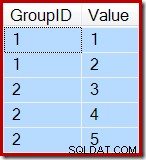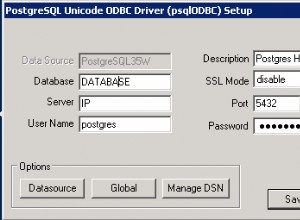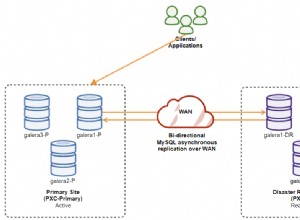Encontrei uma resposta on-line e atualizei a pergunta nesta página para mostrar aos outros como isso é feito.
ATUALIZAÇÃO - PROBLEMA RESOLVIDO
Primeiro, eu acreditei erroneamente que a tabela de origem (aquela no formato de listas adjacentes) precisava ser alterada para incluir um nó de origem. Este não é o caso. Em segundo lugar, eu encontrei uma aula via BING que faz o truque. Eu alterei para PHP5 e converti os bits relacionados ao mysql do autor original para PHP básico. Ele estava usando alguma classe DB. Você pode convertê-los em sua própria classe de abstração de banco de dados posteriormente, se desejar.
Obviamente, se sua "tabela de origem" tiver outras colunas que você deseja mover para a tabela de conjuntos aninhados, você terá que ajustar o método de gravação na classe abaixo.
Espero que isso salve alguém dos mesmos problemas no futuro.
<?php
/**
--
-- Table structure for table `adjacent_table`
--
DROP TABLE IF EXISTS `adjacent_table`;
CREATE TABLE IF NOT EXISTS `adjacent_table` (
`id` int(11) NOT NULL AUTO_INCREMENT,
`father_id` int(11) DEFAULT NULL,
`category` varchar(128) DEFAULT NULL,
PRIMARY KEY (`id`)
) ENGINE=MyISAM DEFAULT CHARSET=latin1 AUTO_INCREMENT=8 ;
--
-- Dumping data for table `adjacent_table`
--
INSERT INTO `adjacent_table` (`id`, `father_id`, `category`) VALUES
(1, 0, 'Books'),
(2, 0, 'CD''s'),
(3, 0, 'Magazines'),
(4, 1, 'Hard Cover'),
(5, 1, 'Large Format'),
(6, 3, 'Vintage');
--
-- Table structure for table `nested_table`
--
DROP TABLE IF EXISTS `nested_table`;
CREATE TABLE IF NOT EXISTS `nested_table` (
`lft` int(11) NOT NULL DEFAULT '0',
`rgt` int(11) DEFAULT NULL,
`id` int(11) DEFAULT NULL,
`category` varchar(128) DEFAULT NULL,
PRIMARY KEY (`lft`),
UNIQUE KEY `id` (`id`),
UNIQUE KEY `rgt` (`rgt`)
) ENGINE=MyISAM DEFAULT CHARSET=latin1;
*/
/**
* @class tree_transformer
* @author Paul Houle, Matthew Toledo
* @created 2008-11-04
* @url https://gen5.info/q/2008/11/04/nested-sets-php-verb-objects-and-noun-objects/
*/
class tree_transformer
{
private $i_count;
private $a_link;
public function __construct($a_link)
{
if(!is_array($a_link)) throw new Exception("First parameter should be an array. Instead, it was type '".gettype($a_link)."'");
$this->i_count = 1;
$this->a_link= $a_link;
}
public function traverse($i_id)
{
$i_lft = $this->i_count;
$this->i_count++;
$a_kid = $this->get_children($i_id);
if ($a_kid)
{
foreach($a_kid as $a_child)
{
$this->traverse($a_child);
}
}
$i_rgt=$this->i_count;
$this->i_count++;
$this->write($i_lft,$i_rgt,$i_id);
}
private function get_children($i_id)
{
return $this->a_link[$i_id];
}
private function write($i_lft,$i_rgt,$i_id)
{
// fetch the source column
$s_query = "SELECT * FROM `adjacent_table` WHERE `id` = '".$i_id."'";
if (!$i_result = mysql_query($s_query))
{
echo "<pre>$s_query</pre>\n";
throw new Exception(mysql_error());
}
$a_source = array();
if (mysql_num_rows($i_result))
{
$a_source = mysql_fetch_assoc($i_result);
}
// root node? label it unless already labeled in source table
if (1 == $i_lft && empty($a_source['category']))
{
$a_source['category'] = 'ROOT';
}
// insert into the new nested tree table
// use mysql_real_escape_string because one value "CD's" has a single '
$s_query = "
INSERT INTO `nested_table`
(`id`,`lft`,`rgt`,`category`)
VALUES (
'".$i_id."',
'".$i_lft."',
'".$i_rgt."',
'".mysql_real_escape_string($a_source['category'])."'
)
";
if (!$i_result = mysql_query($s_query))
{
echo "<pre>$s_query</pre>\n";
throw new Exception(mysql_error());
}
else
{
// success: provide feedback
echo "<p>$s_query</p>\n";
}
}
}
mysql_connect('localhost','USER','PASSWORD') or die(mysql_error());
mysql_select_db('DATABASE') or die(mysql_error());
// build a complete copy of the adjacency table in ram
$s_query = "SELECT `id`,`father_id` FROM `adjacent_table`";
$i_result = mysql_query($s_query);
$a_rows = array();
while ($a_rows[] = mysql_fetch_assoc($i_result));
$a_link = array();
foreach($a_rows as $a_row)
{
$i_father_id = $a_row['father_id'];
$i_child_id = $a_row['id'];
if (!array_key_exists($i_father_id,$a_link))
{
$a_link[$i_father_id]=array();
}
$a_link[$i_father_id][]=$i_child_id;
}
$o_tree_transformer = new tree_transformer($a_link);
$o_tree_transformer->traverse(0);
?>
Aqui está a saída:




